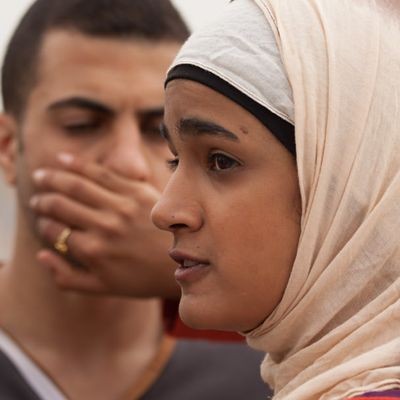
Shot amid the desolate beauty of IsraelÔÇÖs Negev Desert, Elite ZexerÔÇÖs Sand Storm is emerging as one of the most-admired films at this yearÔÇÖs Sundance. It charts the shifting power dynamics between men and women, and between parents and children. And although the film is set among the Bedouin ÔÇö┬áand carries the whiff of authenticity with respect to their rituals and attitudes, thanks to ZexerÔÇÖs having spent years among them┬áÔÇö┬áits story feels universal in its broad strokes.
When we first meet our 18-year-old protagonist Layla (Lamis Ammar), sheÔÇÖs being taught to drive by her doting father, Suliman (Haitham Omari), even as he also chastises her for not doing better in school. Suliman is the kind of guy who can pride himself on his progressiveness ÔÇö as evidenced by LaylaÔÇÖs own very modern attitudes ÔÇö while still being subservient to tradition. We learn that itÔÇÖs the eve of his wedding to a second, younger wife. WhatÔÇÖs more, his first wife, the headstrong Jalila (Ruba Blal-Asfour), LaylaÔÇÖs mother, actually has to help out with the marriage celebrations. Meanwhile, Jalila and Layla seem to be constantly at odds with one another; when Mom discovers, via a cellphone mishap, that Layla has a boyfriend at school, she freaks out.
Layla is smitten with her father and irritated by her mother. But as the story proceeds, she begins to discover where the real power in her family lies: Suliman is in effect a weakling, unable to stand up to the expectations and disdain of others and terrified of the murmur of disapproval and shame. We sense that he didnÔÇÖt even really want this second marriage. Jalila, on the other hand, is personally tough but socially pliant. She can tear into Suliman in private, but dares not in public, for fear of retribution. Layla might think her momÔÇÖs a scold and spoilsport, but itÔÇÖs clear that Jalila is in fact fiercely protecting her children. The young girl and her boyfriend Anwar (Jalal Masrwa), in the meantime, are in the throes of romantic passion. Like the teenagers that they are, theyÔÇÖre convinced that nothing can stand in the way of their love.┬á
Sand Storm will remind some viewers of Deniz Gamze Erg├╝venÔÇÖs Oscar-nominated Mustang from last year. Certainly, both films depict the ways that women are forced into unwanted lives in tradition-minded Middle Eastern cultures (though let it be noted that the mores of a small Black Sea village in Turkey and the mores of a Bedouin village in the Negev are worlds apart from one another). But Mustang showed how a society might destroy a young womanÔÇÖs agency under the delusion that it was protecting and preserving her. The betrayal of Sand Storm feels more intimate and familial. It comes from SulimanÔÇÖs weakness in the face of othersÔÇÖ scorn, and, more important, from the strong-willed JalilaÔÇÖs inability to wield any real power against the forces that once broke her as well. Ultimately, this is a tale of a mother and daughter trapped in a cycle of yearning and despair. ItÔÇÖs a lovely, deeply affecting film.


